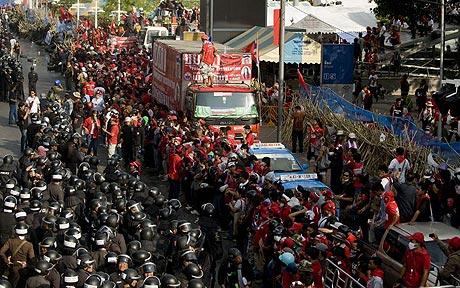
Anti-government demonstrators offered to call off protests that have crippled the Thai capital for six weeks, holding out the prospect of a peaceful solution to the country’s protracted crisis.
The leader of the red-shirt protesters, Veera Musikapong, proffered the olive branch if the government agreed to dissolve parliament in 30 days, with elections to be held in three months.
“If the government accepts and is open to the talks, we are ready to disperse to restore peace in the country. But the government has to stop threatening people and show responsibility for what has happened,” Veera said.
The offer to the government is understood to be an implicit demand that the red-shirt protest sites are not attacked during negotiations, and that a full, independent inquiry is held into the violence that has left dozens of civilians dead.
Previously, the red shirts demanded immediate dissolution of parliament, and for the prime minister, Abhisit Vejjajiva, to leave the country. Abhisit had offered to hold elections by the end of the year but the offer was rejected.
A government spokesman, Panitan Wattanayagorn, told reporters the prime minister had received the offer. He said: “The prime minister attended a meeting on the matter … the government has always been open to talks.”
Twenty-six people have died in clashes on Bangkok’s streets, 25 of those on 10 April when troops opened fire on protestors in pitched battles across the city. One woman died on Thursday night when five grenades, allegedly fired from within the red shirts’ barricaded compound, hit the city’s financial district, including a railway station where a commuter-packed train stood. Eighty-six people were injured.
Before the last-minute offer to resume talks, Bangkok appeared to be heading for further bloodshed. The red shirts, resolute behind forts built of bamboo spears and tyres, said they would not leave until the government stepped down.
The protesters, mainly the rural poor from Thailand’s north, argue the Abhisit government is illegitimate and a puppet of the Bangkok elite and the military.
But the army warned the protesters that their time was running out before they were forcibly removed. An army spokesman, Sunsern Kaewkumnerd, told them: “We don’t want you to risk your lives. If there is a clash you could be hurt by stray bullets. Your time is running out. Please leave the area.”
However, there has been speculation that the army is reluctant to move against the protesters again after a failed attempt to clear them from the streets a week ago. The army chief, Anupong Paochinda, has said an election is the only solution to Thailand’s political crisis.
Many soldiers, particularly in the lower ranks, are openly supportive of the red shirts’ cause. Protesters have nicknamed them “watermelon soldiers”, for their green uniforms on the outside and red sympathies within.
But thousands of troops, armed with machine guns, and riot police are still on the streets of the Thai capital, and several countries, including Britain and the US, have warned their citizens to avoid all non-essential travel to Bangkok.
For the last three nights, the violence was concentrated on a single intersection at the head of Silom Road.
Government supporters wearing yellow shirts have held counter-protests against the reds, hurling bottles and rocks, while pushing over barricades and scuffling with police.
They were out again last night, but the intersection was quieter, as news of the new red shirts’ offer swept Bangkok.